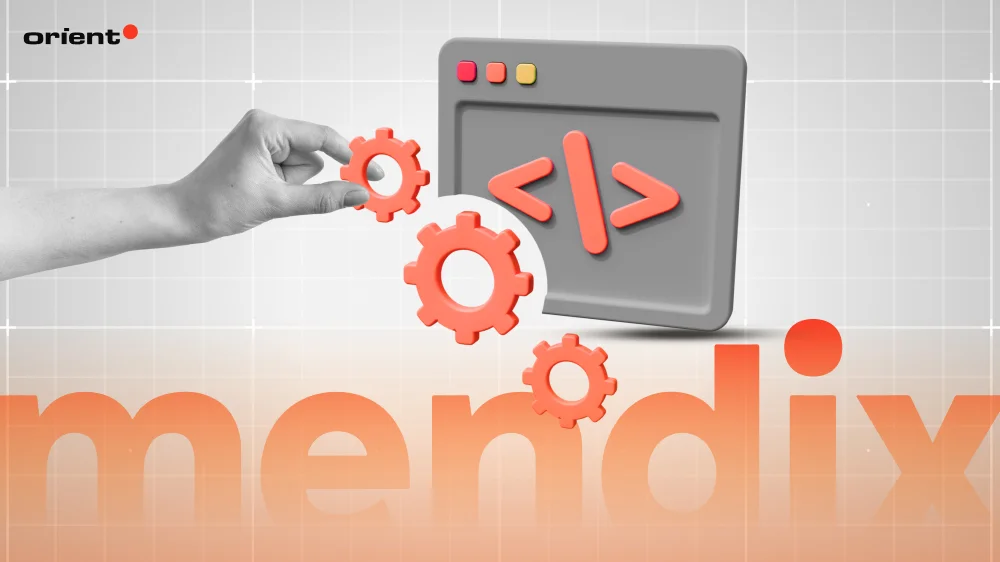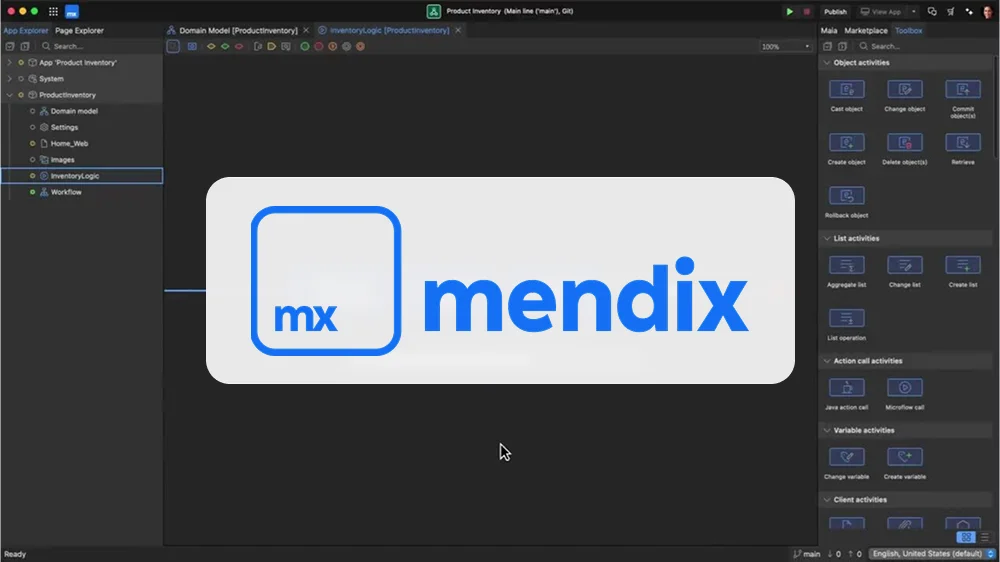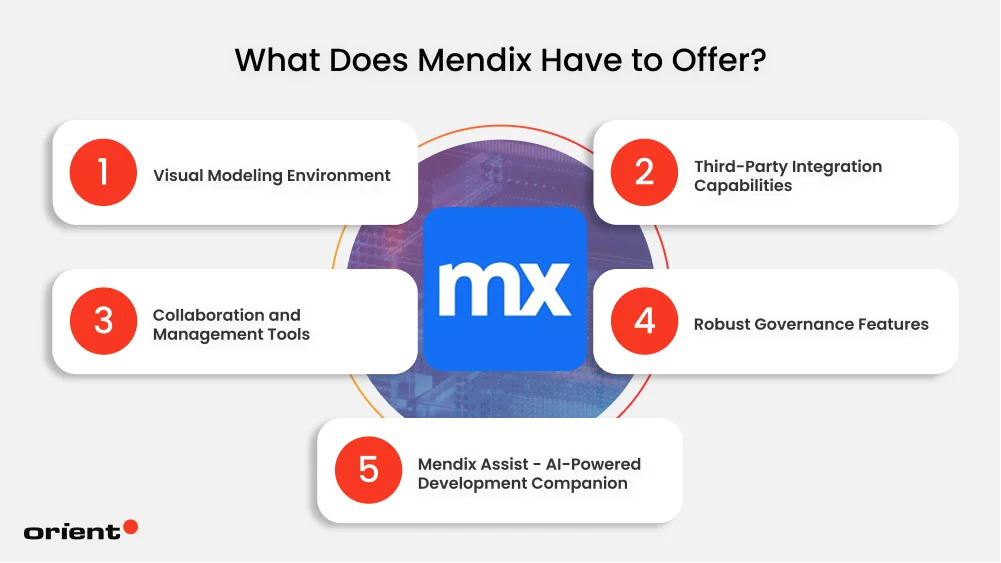
Is Mendix the Right Low-Code Development Platform for Your Project?
Let us guide you through everything you need to know about Mendix – one of today’s most popular low-code app development platforms.

Content Map
More chaptersIn software development, there is often a disconnect between business stakeholders and IT teams. The stakeholders struggle to understand what the IT teams are doing, making it hard for them to comprehend progress updates and submit feedback.
The result often leads to unnecessary back-and-forth and miscommunication, contributing to a poor workflow and disappointing outcomes. Using a low-code application development platform like Mendix can help solve this problem.
In this article, you will learn what Mendix is, its advantages and disadvantages, and how to use it in your next software development project.
Key Takeaways:
- Mendix is a popular low-code platform that developers use to build simple web, mobile, and cross-platform apps.
- It has a user-friendly visual modeling tool that enables developers to drag and drop components into their projects without manual coding.
- If your business operates in a highly regulated environment and has strict requirements, Mendix’s limited functionality may not meet all your needs.
What Is Mendix?
Launched in 2005 by Derek Ross and Derckjan Kruit, Mendix is a low-code, cloud-based application development platform. It is designed to help accelerate digital transformation and bridge the gap between business stakeholders and IT teams. Rather than traditional development methods, Mendix enables organizations to rapidly build, test, deploy, and maintain mobile and web apps using a visual, model-driven approach. Instead of entirely relying on hand-coding, this low-code app development environment allows for dragging components, entities, and logic elements (E.g., UI widgets, microflows, and data connectors) into place within a structured model.

At its core, the Mendix platform promotes cross-team collaboration. It allows users to develop applications with minimal coding through a simple drag-and-drop interface. This makes it easier for both professional developers and non-technical business users to contribute meaningfully throughout the software development lifecycle. For example, business users can participate through Mendix Studio - a no-code solution or an intuitive drag-and-drop environment - and they can more easily monitor progress and submit feedback. Meanwhile, software developers can utilize Mendix Studio Pro for advanced customization, complex logic design, and system integration.
As well as the visual modeling tool, Mendix supports integration capabilities with other systems. Developers can leverage existing IT infrastructure without starting from scratch. They can connect data from Salesforce, Microsoft, SAP, and AWS.
What Does Mendix Have to Offer?
Mendix operates as a low-code platform designed around accessibility, collaboration, and rapid innovation. It achieves this through an ecosystem of tools that streamline each stage of the application development lifecycle.

Visual Modeling Environment
At the heart of Mendix is its visual modeling environment, where users can design and create applications through an intuitive drag-and-drop interface. Instead of writing code manually, users can model data, logic, and interactions within a graphical user interface (GUI). They can create complex workflows and dynamic applications in a fraction of the time that traditional software development requires.
In this approach, business stakeholders and non-technical users can take an active role in app creation, review logic flows, provide feedback, and even build prototypes directly. The result is faster iteration cycles and stronger alignment between business needs and technical execution.
Third-Party Integration Capabilities
Mendix supports connecting seamlessly with external systems such as Microsoft, SAP, Salesforce, AWS, and other enterprise platforms. Through prebuilt connectors, APIs, and Mendix’s Data Hub, developers can access, reuse, and extend existing business data with no need to build core functionalities or start from scratch.
Moreover, integrations with third-party services help reduce redundant development work while optimizing performance by minimizing unnecessary API calls and resource consumption. This interconnectedness is a core strength of Mendix, which can support companies in modernizing their systems and preserving the value of their existing infrastructure simultaneously.
Collaboration and Management Tools
Using the Mendex Portal, developers can collaborate in real time in the same environment. It has dedicated built-in modules for Agile project management, portfolio management, app insights, and version control.
With the Agile project management suite, project managers and their teams can create, refine, and prioritize sprints and milestone deliverables. Meanwhile, the version control system, powered by Git, automatically synchronizes changes from multiple contributors into a unified repository, reducing merge conflicts and ensuring project consistency.
The application insights module adds an extra layer of intelligence by gathering both active (interactive polls) and passive user feedback. This helps teams make informed decisions about usability, performance, and feature enhancements.
Robust Governance Features
Mendix incorporates robust governance controls to ensure security, compliance, and quality across every stage of application development. It supports role-based access control (RBAC) and single sign-on (SSO) through standards like SAML, OAuth 2.0, and OpenID Connect for centralized identity management.
Built-in App Quality Monitoring and audit trails help enforce coding standards, detect vulnerabilities, and maintain regulatory compliance with frameworks such as ISO 27001, SOC 2, and GDPR. Combined with fine-grained environment control, version tracking, and CI/CD integration, Mendix gives enterprises the oversight needed to innovate quickly while maintaining full operational and data governance.
Mendix Assist - AI-Powered Development Companion
Beyond a regular low-code application development platform, Mendix enables AI-assisted development. Integrated with an AI engine, Mendix acts as a built-in intelligent assistant that helps teams design and create apps faster. By analyzing data models, workflows, and logic patterns, Mendix Assist offers real-time recommendations for logical next steps, data mappings, and naming conventions. Combined with AI-powered analytics and integration options for external AI services, Mendix extends automation beyond development.
What Are the Advantages of Using Mendix?
Mendix delivers significant benefits for organizations looking to accelerate software development and digital transformation.

Agile Application Development & Fast Time to Market
By eliminating the need to code manually, developers can work faster and get more done in less time. They can drag-and-drop modules from the intuitive user interface and modify the app logic to suit their requirements. The result is a faster development cycle, helping the client deploy to market quickly and beat the competition.
Mendix enables building applications in a fraction of the time compared to traditional coding. Its visual model environment, drag-and-drop tools, and reusable components eliminate the need for manual coding and reduce much of the repetitive work involved in software creation. Developers can drag and drop modules from the intuitive user interface and modify the app logic to suit their specific requirements.
Enhanced Collaboration
Since Mendix is cloud-based and offers built-in supporting tools, such as centralized version control, portfolio tracking, and Agile workflows, teams worldwide can work simultaneously in a unified workspace. They can track progress, manage sprints, and share updates, knowing all involved are on the same page and are aware of each other’s contributions to the entire project.
The transparency not only enhances communication between technical and non-technical stakeholders but also improves project alignment and accountability. Non-technical stakeholders can visualize the app’s appearance and get a feel for its functionality.
More Affordable Development
When used properly, Mendix has the potential to help reduce software development costs. This is because the platform focuses on a rapid app development process without compromising on quality.
Based on this philosophy, Mendix developers are highly skilled in using the available tools to build and deploy fast, scalable, and beautiful-looking apps in a short time. They can also use third-party integrations to enhance the existing capabilities of an app.
For example, developers can connect Google Maps to a food delivery app, enabling customers to track the status of their deliveries in real time. Naturally, this is much more affordable than building a functional interactive map from scratch.
Flexibility & Scalability
Built on a cloud-native architecture, Mendix allows applications to scale seamlessly across different environments. Teams can deploy to Mendix Cloud, AWS, Azure, or on-premise Kubernetes clusters, depending on their operational needs. This flexibility ensures that software solutions can grow in tandem with business demands while maintaining optimal performance and security.
What Are the Disadvantages of Mendix?
Despite being a powerful low-code application development platform, Mendix has flaws.
The most notable issue is that, as a low-code platform, Mendix may lack the customization developers need to build original, creative apps. For some, the drag-and-drop functionality oversimplifies the development process, resulting in unoriginal apps.

Here are some other potential disadvantages of Mendix.
Limited Flexibility & Scalability
Low-code platforms like Mendix have pre-built components, modules, and connectors. Developers can reuse these pieces of shared code across the entire software application. This helps speed up development and reduce manual coding.
Unfortunately, low-code platforms like Mendix have limited functionality. This is because developers are limited by whatever functionalities the platform has to offer. So, if a business has a specific need, one that Mendix cannot meet, then they will have to request custom code.
Performance Issues
Another potential downside to Mendix is the risk of performance issues. Drag-and-drop components are not optimized for the apps they are being built for.
As developers add more components, they gradually lose control over how well each component is optimized for the app. This can lead to various performance issues, such as slow-loading pages and frequent crashes. As enterprise applications grow in size and complexity, businesses may encounter more performance issues.
Custom code, on the other hand, can be optimized manually to provide the best possible performance. Dedicated software teams can provide low-code and custom solutions that support your technical needs and business goals. Plus, each team member is hand-picked to meet your unique project requirements.
Security Limitations
By default, Mendix has various built-in security options. These include customizable controls for module security, user roles, entity access, app authentication, and more. This allows professional developers to determine who has access to the application and what they can do.
While the security options for platforms like Mendix are commendable, third-party integrations can present issues. Since Mendix makes it easy to integrate outsider apps, citizen developers may accidentally compromise their code. These unchecked vulnerabilities can raise security concerns, increasing the risk of a successful cyberattack.
This is where professional QA and software testing can be of great help. A software development company like Orient Software can perform manual and automated testing. Using the latest software testing tools, we can identify and address security concerns before they compromise your system.
How to Decide If Mendix Is Right for Your App Development Project
Low-code platforms like Mendix are great for building small- to medium-sized applications. However, they lack the depth and customization of custom code. The right approach for you depends on your technical requirements and business goals.

When to Choose Mendix
Got a great idea for a product but low on time and funds? Build a minimum viable product (MVP) with low-code platforms like Mendix.
The drag-and-drop functionality often makes it easy to design a template and input features quickly. This is a great way to test the viability of a new web, mobile, desktop, or cross-platform app. Mendix is also ideal if your app has minimal flexibility and scalability requirements.
Choose Custom Code If You Require
Need to build large-scale enterprise-grade applications? Then, consider a custom solution. Custom software development enables you to build, test, and deploy a software application that meets your unique business requirements.
With custom software, you can provide a solution that caters to a specific set of business users, which is ideal if you operate in a highly regulated industry. You also have more control over the individual components within your app than you would with a low-code platform.
As a result, you can optimize the features, performance, and security of your app to suit your target device and platforms.
Build Amazing Business Applications with Orient Software

Whether you choose a low-code development platform or a custom solution for your project, Orient Software can help. Our highly skilled team is always in a position to bring your small to large-scale product to life. With over 20 years of software development experience, you can count on us to satisfy your project needs on time and within budget.
Contact us today. Discover how our software development services can accelerate your business growth.






